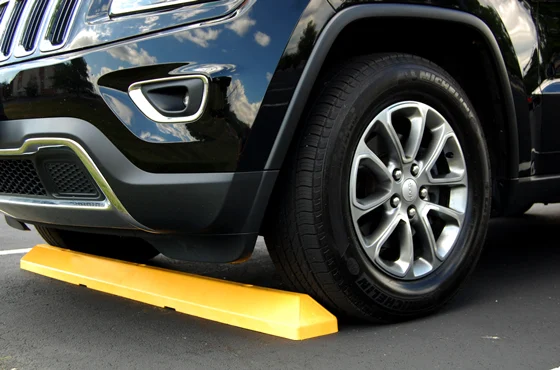Everything You Need to Know About Commercial Parking Blocks
Introduction: What Are Commercial Parking Blocks?
Commercial parking blocks are essential components of parking lot management, designed to demarcate parking spaces and guide vehicles into the correct spots. Made from various materials like rubber, concrete, or plastic, these blocks are commonly used in business environments, retail spaces, and industrial lots. Their primary purpose is to ensure that vehicles are parked within designated spaces while protecting surrounding structures and reducing the risk of accidents. In this article, we will explore the benefits, types, and best practices for using commercial parking blocks.
Why Are Commercial Parking Blocks Important?
1. Organizing Parking Spaces
The most obvious benefit of commercial parking blocks is that they help in organizing the parking area. In a busy commercial environment, efficient parking is crucial for both the convenience of customers and employees. Parking blocks act as visual markers, clearly delineating where vehicles should park. They help prevent cars from parking incorrectly or encroaching on adjacent spaces, ensuring that each spot is used to its full potential.
By guiding drivers to park properly, parking blocks make the parking lot more efficient, reducing the chances of cars taking up multiple spaces or blocking pathways.
2. Preventing Damage to Property
Commercial parking blocks serve as barriers that prevent vehicles from damaging surrounding structures, such as curbs, fences, or buildings. For example, without parking blocks, cars might park too close to a wall, causing unintentional damage to both the vehicle and the property. Parking blocks effectively guide vehicles to stop in the designated area, minimizing the likelihood of property damage.
In addition to protecting physical structures, parking blocks can prevent damage to landscaping and greenery in parking lots, ensuring that plant life is not run over by careless parking.
3. Ensuring Pedestrian Safety
In commercial parking lots, pedestrian safety is a major concern. Without clear guidelines for parking, drivers may accidentally park too close to walkways or crosswalks, which could put pedestrians at risk. Commercial parking blocks help ensure that vehicles stay within their designated spaces and do not block pedestrian pathways.
By using parking blocks, property owners can maintain clear lines of sight for both drivers and pedestrians, ensuring everyone can move through the lot safely.
4. Improving Traffic Flow
When vehicles are parked improperly or inconsistently, it can cause bottlenecks and slow traffic flow in parking lots. Commercial parking blocks help maintain order, allowing cars to move more efficiently through the lot. When parking spaces are clearly defined, drivers can easily find a spot, park, and leave without unnecessary delays.
Properly aligned parking spaces reduce congestion and allow vehicles to navigate the lot smoothly, making the entire parking experience more convenient for everyone involved.
Types of Commercial Parking Blocks
1. Concrete Parking Blocks
Concrete commercial parking blocks are the most traditional and durable option. They provide a long-lasting solution for managing parking spaces in high-traffic areas. Concrete blocks are heavy and resistant to wear, making them ideal for areas that see frequent use. Additionally, they can withstand extreme weather conditions and will not crack or degrade over time, making them a cost-effective choice for commercial lots.
2. Rubber Parking Blocks
Rubber commercial parking blocks are a more flexible and eco-friendly option. Made from recycled materials, rubber blocks are highly durable yet lighter than concrete. They are easy to install and can be used in both temporary and permanent parking setups. Rubber blocks are also less likely to cause damage to vehicles, making them an excellent choice for lots where cars are frequently moving in and out.
3. Plastic Parking Blocks
Plastic parking blocks are a lightweight and affordable alternative to concrete and rubber. They are often used in smaller parking lots or areas that do not experience heavy vehicle traffic. Despite being lightweight, plastic blocks are sturdy enough to withstand regular use and provide clear guidance for parking. Some plastic blocks also come with reflective markings for increased visibility, especially in low-light conditions.
4. Recycled Materials Parking Blocks
For environmentally conscious businesses, parking blocks made from recycled materials are an excellent option. These blocks are typically made from recycled plastics or rubber and offer the same durability and effectiveness as traditional parking blocks. They are a sustainable solution that aligns with green initiatives and can help businesses reduce their carbon footprint.
How to Choose the Right Commercial Parking Blocks
When selecting commercial parking blocks, it’s essential to consider several factors, including:
1. Traffic Volume
The volume of traffic in your parking lot will determine the type of parking blocks you need. High-traffic areas, such as shopping malls or office buildings, may benefit from durable concrete parking blocks, while low-traffic areas might only need lightweight plastic or rubber blocks.
2. Weather Conditions
If your parking lot is exposed to extreme weather conditions, you should choose parking blocks that can withstand temperature fluctuations and precipitation. Concrete blocks are particularly suited for areas with harsh winters, while rubber blocks are more flexible and can handle fluctuating temperatures without cracking.
3. Maintenance Requirements
Some parking blocks require more maintenance than others. Concrete blocks are durable but may need occasional cleaning or resurfacing. Rubber and plastic blocks are easier to maintain and often do not require as much attention over time. Consider your business’s budget and resources when choosing the material for your parking blocks.
4. Aesthetics
While functionality is the primary consideration, aesthetics should not be overlooked. Parking blocks come in different colors and finishes, allowing you to select a style that complements the design of your parking lot. Some businesses even opt for custom parking blocks with branding or logos for a more professional appearance.
Conclusion: The Benefits of Commercial Parking Blocks
Commercial parking blocks are a simple yet highly effective solution for improving parking lot organization, preventing property damage, and ensuring pedestrian safety. By clearly marking parking spaces and guiding vehicles into place, they help businesses maintain a smooth traffic flow while reducing the risk of accidents. Whether you choose concrete, rubber, plastic, or recycled material blocks, commercial parking blocks are an investment that pays off in the long run by increasing the efficiency and safety of your parking lot.




